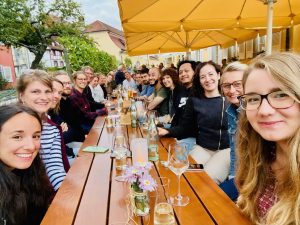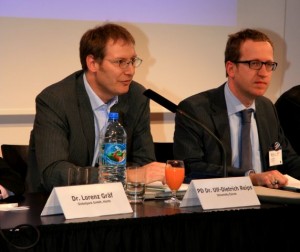Current collaborations
e-SNARC Collaboration Project with University Tuebingen
Replicability of Fundamental Results on Spatial-Numerical Associations in Highly Powered Online Experiments
Spatial-Numerical Associations (SNAs) play a fundamental role for how humans represent numbers, and how they learn and use mathematics. Among SNAs, the Spatial-Numerical Association of Response Codes (SNARC, i.e., faster responses to small / large magnitude numbers with left / right hand respectively) effect is the hallmark, most thoroughly investigated effect. Nevertheless, despite almost three decades of research, many pivotal questions still remain unresolved. This may be partly due to the fact that several early SNARC results were obtained in small N (and probably underpowered) experiments.
Because this limitation holds true even for theoretically important and popular foundations of the SNARC effect, our understanding of SNAs considerably lacks in solidity of evidence and makes our common ground for further research shaky.
For the presently granted project, we identify 3 fundamental questions about the SNAs and the SNARC effect, which we plan to address in highly powered large-scale online experiments:
(1) automaticity – i.e., how much active semantic processing of the numerical stimuli is needed to evoke the spatial association (Learn more about automaticity)
(2) task (in- )dependence – i.e., whether and how SNAs differ depending on the specific task we use to measure them (Learn more about task (in)dependence)
(3) context (in-)dependence – i.e., whether spatial associations depend only on relative or also on absolute numerical magnitudes (Learn more about context (in)dependence)
For future empirical and theoretical developments, it is essential to clarify these fundamental properties of the SNARC effect and provide high-quality empirical evidence, whether and under which circumstances these properties exist or not, and how large and reliable they are.
Project start: October 2021
5th Summer School 2023
In an exciting collaboration between instructors from iScience and California State University – Fullerton, we held the 5th Summer School on Internet-based Data Collection and Analysis. The event was organised at the University of Konstanz, Germany.
We welcomed 29 participants, from International and German Institutes and with diverse backgrounds (psychology, marketing, behavioral epidemiology and educational science).
We covered diverse topics of Internet-based Data Collection and Analysis, and we used together different tools (e.g., WEXTOR, Open Lab, and Samply).
For more information on the 5th Summer School, go to the program and overview links.

Summer school dinner in Meersburg.
2009 – 2010 Collaborations
In a new collaboration between iScience and partners from several countries we will research intercultural competencies. Part of this project is trait d’union (Journal Scolaire Multimédia International). The project is coordinated by the German School in Bilbao, Universidad de Deusto is an official partner.
We collaborate closely with morelab and smartlab.
At Universidad de Deusto we further collaborate with Pedro J. Oiarzabal and with ICT and therapy research group.
For more information on our international collaborations see link to picture gallery below and personal pages linked from the Team section.
View some pictures with collaborators at various international events.

